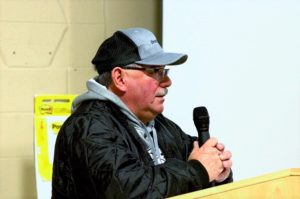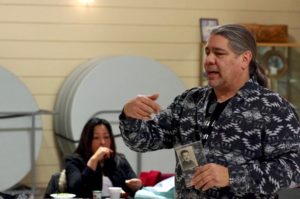Three time Olympic ski jumper inspires youth at AETS Aboriginal leadership program conference

By Rick Garrick
THUNDER BAY — Anishinabek Employment and Training Services (AETS) kicked off its Aboriginal Leadership Program with a presentation by three-time Olympic ski jumper Steve Collins on Jan. 13 in Thunder Bay.
“Every day [ski jumping coach Slav Kardas] coached you, he really made you feel like a world champion and I think that’s what brought me to where I competed at a world-class level,” says Collins, a Fort William citizen who won three international ski jumping events and competed at the 1980, 1984 and 1988 Olympic Winter Games. “I always wanted to be the best in the world, and that was my goal.”
Collins left the national team following the 1985 season but continued to train on his own. He won the 90-metre jump and finished third in the 70-metre jump at the 1986 Canadian championships and finished in 13th place in the normal hill event at the 1988 Olympic Winter Games, the best result ever by a Canadian in Olympic normal hill competition.
“I had to go out on my own and qualify for the Olympics in 1988,” Collins says. “I persevered and made my way back to the national team for the 1988 Olympics. Everybody makes a choice in life, and I think just being positive to youth and teaching them how to persevere through life — that is more important for everybody in this room is the way you speak to your kids and bring them up to be the best they can ever be.”
Tannis Kastern, life skills officer with AETS and Fort William councillor, says Collins is called Flying Eagle for his ski jumping exploits.
“Stephen is a remarkable person, not just in his glory days but even to this day he contributes and he gives back to the community that supported him,” Kastern says. “He works in the arena, he mentors athletes who are using our arena and he just speaks to his experience as an Anishinaabe man in a [European-developed] sport.”
Fort William Chief Peter Collins says Steve is a “good strong mentor.”
“We need more mentors like him,” Chief Collins says. “If I look at the youth around us here today, [there’s] great opportunities to be mentors for generations to come.”
About 26 participants signed up for the Aboriginal Leadership Program, which opened with a two-day retreat on Jan. 13-14 at the Ka-Na-Chi-Hih Specialized Solvent Abuse Treatment Centre. The program also includes seven leadership days based on the Seven Grandfather Teachings over the next few months.
“I wanted to surround myself with people that had a passion for leadership and to surround myself with some like-minded people,” says Craig Hardy, a Fort William citizen and one of the participants. “And get a better understanding of leadership, not just with the people I deal with but within myself as well and to really try to promote and develop a mindset where I am going to develop leadership skills for my business and everybody else I touch in my life.”

Ron Kanutski, a Red Rock Indian Band citizen, spoke about routes or paths to wellness during his workshop on the first day of the retreat.
“I think I’ve been pretty proactive in my 30 years of involvement because I came from a place of being stuck or being stagnant,” Kanutski says. “It’s not a good place to be at, and when I found my way out of that I thought this is the best gift that a person could share with anyone.”
The second day of the retreat featured a land-based activity by Audrey Deroy and George Price with a focus on team capacity building and learning a skill.


